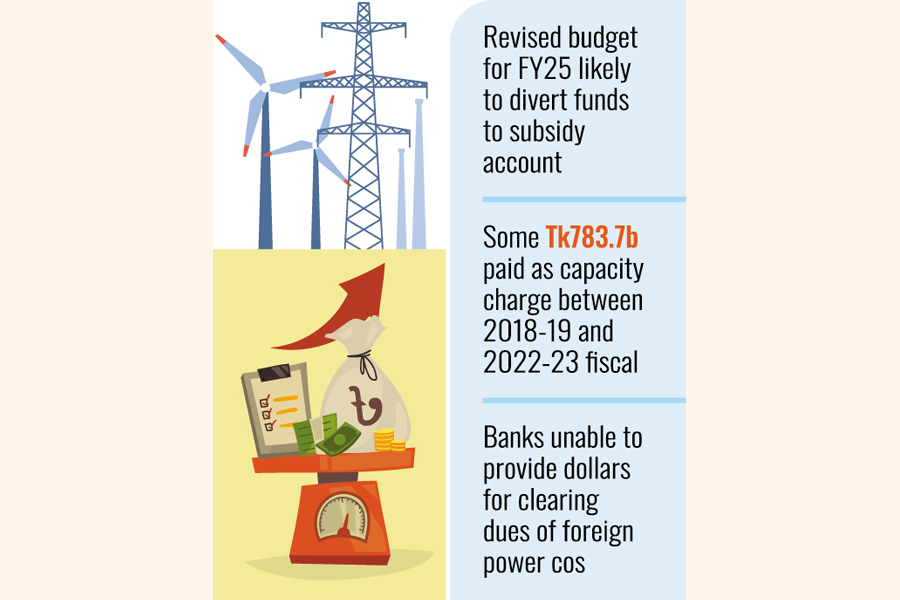FY'25 power subsidy being doubled to pay off dues to pvt plants
Hefty capacity charge for no power use bloats arrears

Published :
Updated :

Budgetary subsidy allocation may nearly double to Tk700 billion as the interim government wants to pay off accumulated arrears to the private-sector power producers within this fiscal year.
Officials say the outlay in the current budget for fiscal year (FY) 2024-25 for payout to the independent power producers, contracted by the ousted government, is Tk 360 billion which may be ramped up for the payout.
"We are working to revise the national budget. We have taken a policy to clear all the dues, including the capacity charge, to the private-sector power plants by enhancing the current amount of subsidies," says a senior Ministry of Finance (MoF) official.
"Accordingly, we have worked out and it is needed to increase the current allocation to almost double," he adds.
He says primarily, they have decided to enhance the power subsidy to some Tk 700 billion in the revised budget based on the domestic revenue-collection forecast." In the case of poor revenue collection, the allocation could be a bit lower than the planned Tk 700 billion."
The government owed to the independent power producers (IPPs) and the private-sector rental- power plants nearly Tk 210 billion till September 2024, as per data collected by the FE from the Power Division and the MoF's reports on the payment obligations.
From the conflated statistics it was found that the government had paid off arrears, including capacity payments, to the IPPs and private rental power plants till March last year.
"We are paying the arrears every month to the private power-plant owners. But the arrears are comparatively higher than our monthly payments. So, we will allocate a higher amount of money in the revised national budget for the current FY20205," another MoF official told the FE Friday.
From the next FY2026, Power Division would slash the subsidy on power sector drastically and try to ensure loss-free supply within next few years, says one official concerned.
The government purchases power at higher rates from the costly IPPs and the rental-power producers and sells to the consumers at lower rates by way of subsidizing the distribution.
Bangladesh wants to be a liability-free country to the IPPs and private-sector power plants from the next fiscal year, he adds.
In the last FY2024 revised budget, the government had allocated Tk 394.06 billion in subsidy for the power sector.
Data from MoF, Bangladesh Power Development Board (BPDB) and a non-government research organisation show a total of Tk 783.7 billion had been paid as capacity charges since 2018-19 till 2022-23 fiscal.
Some Tk 62.41 billion was paid in FY2019, Tk 89.29 billion in 2020, Tk 132 billion in 2021, Tk 240 billion in 2022 and Tk 260 billion paid in FY2023 as capacity charges for private-and rental-power plants.
Such huge capacity payments to IPPs and rentals have become a big burden for the government while struggling with emaciated foreign-exchange reserves and rising external debts.
The banks are unable to provide dollars to repay dues of the foreign companies in the power and energy sector. Bangladesh had a reserves of over US$48.0 billion two years back, which has depleted to $20 billion in recent days.
The toppled Sheikh Hasina regime in its three terms had paid a total of Tk 1.05 trillion to 82 IPPs and 32 rental-power plants in capacity charge or rental payments, former State Minister for Power, Energy and Mineral Resources Nasrul Hamid said in September 2023.
The government needs to pay the capacity charges to the IPPs and rental-power plants, including Bangladesh-China Power Company Plant (Payra power plant), Meghnaghat 450MW Power Ltd, 210MW Rural Power Co Ltd, 335MW Summit-Meghnaghat Power Ltd and 414MW Sembcorp NWPC Ltd, 145MW Aggreko International Projects.
Another MoF official says nearly an additional Tk300 billion to Tk 350 billion might be diverted from the development budget into the power-subsidy fund in the national budget, as reports say development works are being scaled down, especially in megaprojects, for fund crunch in the interim period.
"We want to cut the development budget. The amount to be saved from development is planned to be diverted into subsidy for the power sector by revising the current allocation. Our mission is to clear the dues to the IPPs and rental power plants within this fiscal," he adds.
The past Hasina government allowed many private-sector power producers to set up electricity-generation plants most of which are costly in terms of electricity pricing, resulting in rising government liabilities.
Usually, BPDB sells electricity to consumers at rates lower than it purchases from the IPPs and the gap needs to be made up with state subsidies.
Most of the IPPs and rental-power plants are HFO- or diesel-based ones which is costly for generating the electricity.
The power board purchases the electricity from the private-sector plants at a cost that varies from Tk 14 to Tk 26 per kilowatt hour (kwh) for supplying into the national grid.
On the other hand, the average retail price of electricity to the consumers is some Tk 8.95 per unit and the average bulk electricity tariff is Tk 7.04 per unit.
Meanwhile, the government had paid a total of Tk 280 billion worth of funds as capacity charges in FY2023 to the favoured power producers.
It has also issued special bonds in recent months to clear capacity-charge payments to IPP and rental plants.
kabirhumayan10@gmail.com


 For all latest news, follow The Financial Express Google News channel.
For all latest news, follow The Financial Express Google News channel.